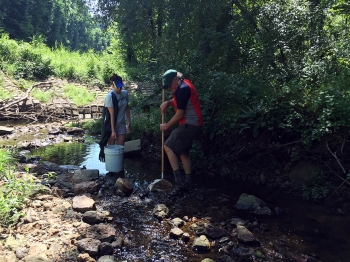Villanova Engineering Professor among Research Grant Recipients Announced by Academy of Natural Sciences
$4 Million in Research Grants from Delaware Watershed Research Fund to Improve Water Quality in the Delaware River and Surrounding Land

Graduate student Emily Carambelas and Dr. Stan Kemp, the project’s co-PI from the University of Baltimore, conduct stream sampling.
How do contaminants from municipal wastewater treatment plants and runoff containing pesticides in the New Jersey Pinelands affect the development of fish and frogs? How will future development affect communities up and down the Delaware River, and what’s the best way to protect the environment there? How do you convince farmers to adopt new, eco-friendly ways of managing their land so fertilizers and animal waste don’t pollute the nearest stream?
These are some of the quandaries that 10 federal, state, private and university research teams will be tackling over the next three years thanks to $4 million in research grants announced today by the Academy of Natural Sciences of Drexel University. Among the grant recipients is Villanova University Professor of Civil and Environmental Engineering Andrea Welker, PhD, the College of Engineering’s new associate dean of academic affairs. Dr. Welker and the University of Baltimore’s Stanley J. Kemp, PhD, assistant professor, Division of Science, Information Arts, and Technology—whose grant totals $379,645—will evaluate the “Effectiveness of Stormwater Controls at the Promenade at Granite Run” in Media, Pa.
The grants are funded by the Delaware Watershed Research Fund, established with the support of the William Penn Foundation, to inform and advance on-the-ground conservation work including efforts currently underway as part of the Delaware River Watershed Initiative. The Philadelphia-based philanthropy so far has committed $60 million to 48 nonprofit organizations in the initiative, including the Academy, who are working together to reduce threats to water quality in eight carefully selected areas within the larger Delaware River Watershed.
“These projects will answer questions that will help us better understand how to protect and restore water quality, especially in the Delaware Watershed,” said Roland Wall, the Academy’s senior director for environmental initiatives. “The results of these studies can be applied to other watersheds around the country.”
Asking, “Can a densely developed site, designed in compliance with modern local ordinances, reverse stream function deterioration caused by a densely developed site designed in compliance with older ordinances?,” Drs. Welker and Kemp are focusing their research on the recently demolished and nearly 100 percent impervious Granite Run Mall. Located at the headwaters of the Chrome Run in the Delaware River Watershed, the site is being converted into a 58-acre open air marketplace, and is being designed in compliance with modern ordinances, including stormwater management.
“This type of massive redevelopment presents a unique opportunity to examine the effectiveness of current stormwater practice and validate the approach of focusing stormwater control measure (SCM) implementation in headwaters,” said Dr. Welker.
“We are excited about the positive implications this research is likely to have in advancing watershed protection across the entire Delaware River basin and beyond,” said Andrew Johnson, watershed protection program director at the William Penn Foundation. “Our region is fortunate to be home to many strong conservation organizations working strategically to protect and restore water quality in the Delaware River Watershed, including the 48 involved in the Delaware River Watershed Initiative. The researched grants announced by the Academy today will inform that work, and we hope make it even more strategic and effective.”
The Delaware River Watershed covers more than 13,500 square miles in Pennsylvania, New Jersey, Delaware and New York. In addition to its ecological significance, the watershed is a major source of drinking water for 15 million people and supports an array of clean-water-dependent businesses valued at $25 billion per year.
While the river’s health has improved significantly over the last 50 years, many streams and rivers flowing into it remain impaired by contaminated water flowing from farms, streets, wastewater treatment plants, and other sources. The DRWI was formed in early 2014 to monitor, combat and clean up these problems and to advance work to permanently protect the cleanest water in the system.
About the Academy of Natural Sciences of Drexel University
Founded in 1812, the Academy of Natural Sciences of Drexel University is a leading natural history museum dedicated to advancing research, education, and public engagement in biodiversity and environmental science.
About the William Penn Foundation
The William Penn Foundation, founded in 1945 by Otto and Phoebe Haas, is dedicated to improving the quality of life in the Greater Philadelphia region through efforts that increase educational opportunities for children from low-income families, ensure a sustainable environment, foster creativity that enhances civic life, and advance philanthropy in the Philadelphia region. In partnership with others, the Foundation works to advance opportunity, ensure sustainability, and enable effective solutions. Since inception, the Foundation has made nearly 10,000 grants totaling over $1.6 billion. The Foundation’s assets exceed $2.3 billion as of March 31, 2015.
About the Delaware River Watershed Initiative
The Delaware River Watershed Initiative, launched in January 2014, is an unprecedented collaboration of almost 50 leading nonprofits that have developed shared action plans to reduce threats to water quality in carefully selected areas of the Delaware River Basin. Informed by science, the initiative is designed to protect and restore ecological systems that provide drinking water to 15 million people and support $25 billion in water-related jobs and industry.
